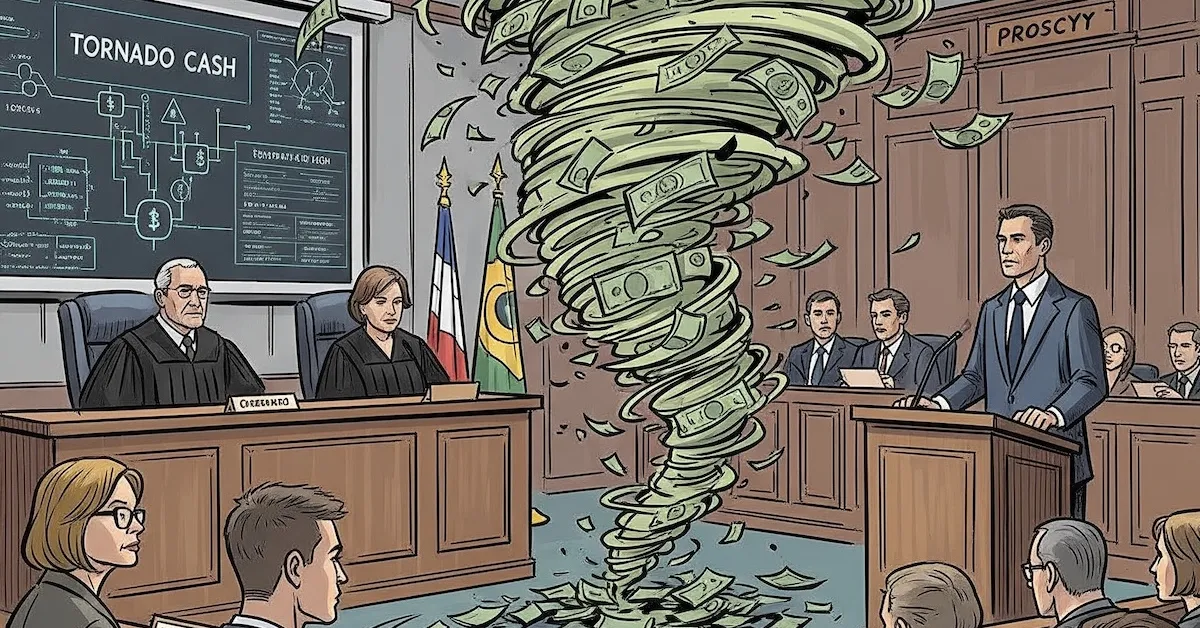Guilty Verdict Rocks Crypto World: Tornado Cash Developer Convicted

The Tornado Cash trial, a high-stakes legal proceeding with significant implications for developers of noncustodial Bitcoin and crypto technology, as well as privacy-preserving software, has drawn to a close. Amanda Tuminelli, executive director and chief legal officer for the DeFi Education Fund, provided extensive insights into the case, emphasizing the charges against Tornado Cash co-founder Roman Storm and the broader legal landscape.
Tuminelli detailed the three charges levied against Storm, with a particular focus on the conspiracy to operate an unlicensed money transmitting business. As an expert on 18 U.S. Code § 1960, the federal law prohibiting the operation of such businesses without a proper license, Tuminelli had initially argued that Storm had not violated this statute in creating and operating Tornado Cash, a crypto mixing service built on Ethereum.
The discussion also encompassed legislative efforts like the CLARITY Act and the Blockchain Regulatory Certainty Act (BRCA), both designed to protect developers of non-controlling (noncustodial) crypto technology. These bills assert that such developers and purveyors should not require a money transmitting license nor be subject to existing money transmission laws. Furthermore, Tuminelli highlighted concerns over the Department of Justice’s (DoJ) deviation from 2019 FinCEN guidance, warning that it threatens innovation in the crypto space and could lead to continued prosecution of developers like Storm, despite a memo from U.S. Deputy Attorney General Todd Blanche indicating a shift away from targeting virtual currency mixing services.
In a pivotal development, Roman Storm was found guilty in the Southern District of New York (SDNY) on the second count of his indictment: conspiracy to operate an unlicensed money transmitting business. This verdict concluded the Tornado Cash trial. The jury, however, did not reach a unanimous verdict on the other two charges—conspiracy to commit money laundering and conspiracy to violate sanctions—after three and a half days of deliberation.
Following the guilty verdict, Storm now faces up to five years in prison. The prosecution moved to remand Storm into custody, citing him as a flight risk. However, Judge Failla rejected this motion. The defense, led by Ms. Klein, successfully argued against the remand, emphasizing Storm's strong ties to the United States, including his Washington state home secured by a $2 million bail bond, his daughter and girlfriend residing in the U.S., and his parents being green card holders. The judge acknowledged that while Storm's incentives may have shifted, the
You may also like...
AMG Unleashes a Beast: The GT2 Edition W16 Breaks Records, But Without Its Namesake Engine!

Mercedes-AMG has unveiled its most extreme customer racing car, the GT2 Edition W16, a track-only limited edition inspir...
Mercedes Shocks with G-Wagen Cabriolet Tease: Iconic SUV Goes Topless!

Mercedes-Benz has officially announced the return of the G-Class Cabriolet, slated for release in 2026, bringing an open...
US Gov Makes History: GDP Data Now Immortalized on Bitcoin Blockchain

The U.S. Commerce Department has begun publishing gross domestic product (GDP) data on public blockchains like Bitcoin a...
Tornado Cash Verdict Drops: Roman Storm Convicted in Landmark Crypto Trial

Tornado Cash co-founder Roman Storm has been found guilty of conspiracy to operate an unlicensed money transmitting busi...
Luxury Giant's Legacy: Armani's Empire Passes to Heirs After His Death

The fashion world mourns the passing of Giorgio Armani, who at 91, leaves behind an independent empire entrusted to his ...
AI Data Centers Exposed: $165 Billion 'Phantom Debt' Scandal Looms Over Tax Breaks

Doña Ana County, New Mexico, is pursuing an ambitious plan to become a major AI data center hub through 'Project Jupiter...
Political Titans Mobilize: Ambode & Speaker Tajudeen Lead Charge for Tinubu's 2027 Re-election Bid

Key political figures, including House Speaker Abbas Tajudeen and former Lagos Governor Akinwunmi Ambode, have publicly ...
Tinubu's Bold Naira Claim Sparks Fact-Check Fury: Was it N1,900/$ or N1,450/$?

President Bola Ahmed Tinubu recently claimed the naira strengthened significantly under his tenure, citing an improvemen...